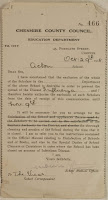Teaching
methods may have changed over time, but pupils have had to learn the same
subjects for generations. Some school
exercise books have been deposited with us, such as the French and physics books
of a child named Neild at Sandbach School from 1908. Science was perhaps not his best subject, as
whole pages of his ‘pysics’ book have been scored through in red ink with the
word ‘bad’, presumably written by the teacher who made many other corrections
of his work!
 The
arithmetic book of a girl called Elizabeth Stockton at Harthill County Primary
School in 1887 (SL196/7441/8) was much better though - her mathematical
problems on silverware weights prompted the teacher to write, “Elizabeth has
made a very good beginning, and with care she promises to do well, for she
takes great care with her work which is clean and neat throughout."
The
arithmetic book of a girl called Elizabeth Stockton at Harthill County Primary
School in 1887 (SL196/7441/8) was much better though - her mathematical
problems on silverware weights prompted the teacher to write, “Elizabeth has
made a very good beginning, and with care she promises to do well, for she
takes great care with her work which is clean and neat throughout."All schools have rules, and we hold a copy of the ‘Loyal Devoir’ for Mostyn House School in Parkgate, an instructional book written by the head teacher in 1920 listing school rules such as being truthful, having good manners and knowing how to behave in chapel and at a cricket match, for instance. It also includes an introduction 'To My Boys' reflecting on the effects of World War One on the school and on boys of their class.
We
have several prospectuses of Mostyn House School from the 1880s to the 1930s as
well, which included school uniform requirements that were rather different to
today: the 1889 version (document reference SP5/8427/18/1) stated,
“boys will need for Sunday wear an ‘Eton’ or ‘Norfolk’ suit, and a silk hat. For ordinary wear a dark knickerbocker suit and ‘Eton’ collars are recommended”.
When
school rules were broken, ‘punishment books’ from dozens of schools across
Cheshire detail the corporal punishment children received as a result. To take one example, Byley Primary School in
the 1910s recorded giving one or two 'strokes', presumably with a cane, for
carelessness in work or disobedience; two strokes for copying or for
refusing to answer; four strokes for not doing work and six strokes were
given for telling untruths to a child’s parent (SL 31/2). Other punishment
books went into further detail: for instance Acton Church of England Primary
had a boy given four light strokes with cane, two on each hand, and detained
in school 30 minutes each day for a fortnight, for stealing cardboard coins
from school and trying to pass them on to the local shop keeper in 1911, and playing truant resulted in one boy
being struck six to eight times across the buttocks in 1919 (SL2/4).
Attitudes
to corporal punishment changed over time, as illustrated by a 1968 Department
of Education and Science circular found within the records of Macclesfield
Parkroyal County Primary School. The Secretary of State acknowledged many
teachers’ need for a “reasonable amount of force” in some circumstances, but
believed that
“the practice of corporal punishment should disappear from our schools, and I hope that the local education authorities, the governing bodies of schools and the teachers themselves will all use their powers and influence to achieve this end."
Schools
today require high levels of attendance, but everyone has had to spend the
occasional day at home due to being ill.
In the records of Alsager County Secondary School, we found guidance of
how long sick children should take off school, such as 28 days from the
beginning of the “characteristic cough” of whooping cough. Diphtheria and small pox were also listed as
some of the “commoner infectious diseases”, showing how far medical science has
advanced today. We also
found an example of Cheshire County Council playing its part in tackling the
1918 flu pandemic in the papers of Acton Church of England School. A communication from the Education
Department’s School Medical Officer shows the whole school being closed for
almost a fortnight “to prevent the spread of Influenza”, noting “it will be
necessary for you to arrange for the thorough cleaning and aeration of the
school for the time it is closed”.








